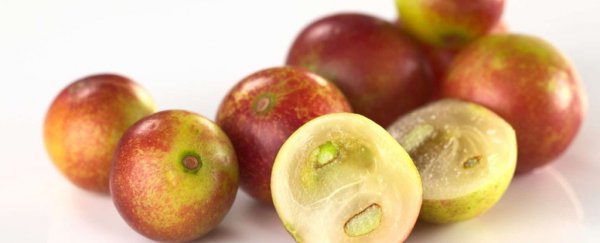A fruit that only grows in the Amazonian rainforest has shown a surprising effect. It's called camu camu, and when its extract was fed to mice living on a high-fat, high-sugar diet, it seemed to slow weight gain - suggesting it could play a role in fighting obesity, according to researchers from Université Laval in Canada.
Already being marketed as a "superfood", camu camu (Myrciaria dubia), a close relative of guavaberry, does have some interesting characteristics. The small, round fruit is extraordinarily rich in vitamin C, and a class of nutrients called polyphenols.
"We demonstrated the beneficial health effects of polyphenol-rich berries in previous studies," said medical researcher André Marette of Université Laval.
"That's what gave us the idea to test the effects of camu camu on obesity and metabolic disease."
The team's study was conducted on fattened lab mice. For eight weeks, the mice were fed a diet that was really high in both fat and sugar, while a baseline control group was fed a low-fat, low-sugar diet.
Half the mice on the high-fat, high-sugar diet were also given a camu camu extract, while the other half was not.
At the end of the eight-week experiment, the mice that were fed camu camu had gained 50 percent less weight than the mice that were not. Their weight gain profile was similar to that of the baseline control group, the researchers found.
The research team believes the camu camu extract could have caused an increase in resting metabolism, which in turn led to lower weight gain.
In addition, the mice who had been fed the camu camu extract showed improved glucose tolerance and insulin sensitivity, and a reduced concentration of blood endotoxins and metabolic inflammation.
"All these changes were accompanied by a reshaping of the intestinal microbiota, including a blooming of A. muciniphila and a significant reduction in Lactobacillus bacteria," Marette said.
This got tested, too. Intestinal microbiota from the camu camu mice were transplanted to germ-free mice that didn't have an intestinal microbiome. This temporarily and partially replicated the metabolic effects seen in the camu camu mice.
These results seem to indicate that the reorganisation of the gut microbiome is part of the mechanism at play here.
But before you dash out to get your hands on powdered camu camu, note that the effect has yet to be tested on humans. As we know, amazing results observed in mice in the lab often can't be replicated in human subjects.
Seeing if camu camu does indeed help reduce weight gain in humans is next on the research team's agenda.
The study has been published in the journal Gut.
